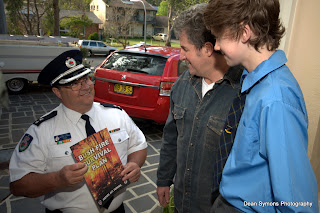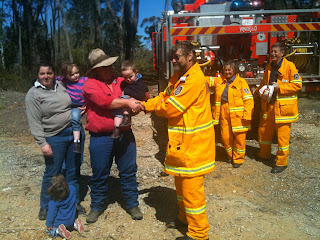 |
| This truck was out at a community engagement function. |
As with many organisations there is often discussion regarding the importance and role of Community engagement. Some members are passionate about the benefits while others cannot see beyond the spray of water from the hose. Many others talk about community engagement being 'core business' but for some that is where it stops - at the talk. It is good we are having these conversations, at least the level of consciousness around community engagement is increasing - the big challenge is to raise the level of consciousness into yet higher levels of activity!
We have over 70 000 members with the clear majority of these being volunteers who all joined the NSW RFS for different reasons.
For every person that simply states they 'joined to put the wet stuff on the hot stuff' there is another person complaining that our communities 'expect a fire truck to arrive in every drive way' during a fire. It is sometimes believed that the minimal expectation may be at least one fire truck per street!
So how do we take the next step forward? How do we keep raising that level of consciousness? How do we let our community members know that a fire truck may not always arrive in their street? How do we increase the understanding within the NSW RFS that community engagement compliments active fire fighting activities?
How do we get our often complex messages out in a way that the community can understand?
Let's detour a minute to that complex messaging and disect that a bit further. The message to the community is;
 'The safest option is to leave early well before the fire impacts. However if you chose to stay and defend you must ensure you have a well prepared home, in a defendable space and be physically and emotionally capable. But you should never stay and defend on catastrophic days. On extreme weather days only consider staying if you are prepared to the highest level such as your home is specially designed, constructed or modified and situated to withstand a fire.'
'The safest option is to leave early well before the fire impacts. However if you chose to stay and defend you must ensure you have a well prepared home, in a defendable space and be physically and emotionally capable. But you should never stay and defend on catastrophic days. On extreme weather days only consider staying if you are prepared to the highest level such as your home is specially designed, constructed or modified and situated to withstand a fire.'
This is only part of our message. I have not mentioned other critical facets such as the Fire Danger Ratings, Warning and Alerts or Neighbourhood Safer Places.
Put yourself in the shoes of a community member with no fire knowledge or background and there arises another myriad of questions such as;
• what is leave early - the day before, the morning of or when the fire is 50 kms away
• how do I know when the fire will impact
• what is a defendable space
• why do I need to be emotionally prepared
• how do I know my home is prepared to the highest level
By the way, the answers to these questions, and others, can be found in the recently launched NSW RFS Bush Fire Survival Plan
So back to those steps, to moving forward, to raising yet more the active support for community engagement within the NSW RFS and how do we engage our communities?
Surprisingly the answer is not simple - it rarely is when we are talking about behavioural change.
We need to engage our colleagues internally so they can REALLY understand the benefits to move them beyond talk and into real support or action. We need to increase their level of understanding - that effective engagement leads to engaged communties and can free them up to focus on the actual fire fighting during an incident.
Genuine and effective community engagement has benefits for both the members of the RFS and the communities in which we serve.
We need to understand that recognising the diversity of NSW is key to developing our capability to engage our communities. An ageing population, increasing cultural diversity, higher education rates and significant change in family structures; coupled with the ongoing, rapid rate of technological change and the impact weather conditions have on communities openness to fire safety messages, all present challenges and opportunities for those of us involved in community engagement in the NSW RFS.
In my next post I will take a look at internal engagement before we talk more about external engagement. Many of you are doing some brilliant work with engaging internally and sharing the skills and importance of community engagement. I am hoping our Road Show and Tell in a month will help share this work across the state.
You're input and ideas are very very welcome.
Engagement can be strengthened by the sound of many conversations.
 |
| Ensuring the importance of the Bush Fire Survival Plan is understood |
How do we get our often complex messages out in a way that the community can understand?
Let's detour a minute to that complex messaging and disect that a bit further. The message to the community is;
 'The safest option is to leave early well before the fire impacts. However if you chose to stay and defend you must ensure you have a well prepared home, in a defendable space and be physically and emotionally capable. But you should never stay and defend on catastrophic days. On extreme weather days only consider staying if you are prepared to the highest level such as your home is specially designed, constructed or modified and situated to withstand a fire.'
'The safest option is to leave early well before the fire impacts. However if you chose to stay and defend you must ensure you have a well prepared home, in a defendable space and be physically and emotionally capable. But you should never stay and defend on catastrophic days. On extreme weather days only consider staying if you are prepared to the highest level such as your home is specially designed, constructed or modified and situated to withstand a fire.'This is only part of our message. I have not mentioned other critical facets such as the Fire Danger Ratings, Warning and Alerts or Neighbourhood Safer Places.
Put yourself in the shoes of a community member with no fire knowledge or background and there arises another myriad of questions such as;
• what is leave early - the day before, the morning of or when the fire is 50 kms away
• how do I know when the fire will impact
• what is a defendable space
• why do I need to be emotionally prepared
• how do I know my home is prepared to the highest level
By the way, the answers to these questions, and others, can be found in the recently launched NSW RFS Bush Fire Survival Plan
So back to those steps, to moving forward, to raising yet more the active support for community engagement within the NSW RFS and how do we engage our communities?
Surprisingly the answer is not simple - it rarely is when we are talking about behavioural change.
We need to engage our colleagues internally so they can REALLY understand the benefits to move them beyond talk and into real support or action. We need to increase their level of understanding - that effective engagement leads to engaged communties and can free them up to focus on the actual fire fighting during an incident.
Genuine and effective community engagement has benefits for both the members of the RFS and the communities in which we serve.
 |
| Our brigades share knowledge on fire safety with their communities |
Of equal importance is the need to recognise and utilise the diversity of our members who deliver community engagement.
In my next post I will take a look at internal engagement before we talk more about external engagement. Many of you are doing some brilliant work with engaging internally and sharing the skills and importance of community engagement. I am hoping our Road Show and Tell in a month will help share this work across the state.
You're input and ideas are very very welcome.
Engagement can be strengthened by the sound of many conversations.
Cheers from Tanyia

8 comments:
How long before you do the next part of this?
If part of the community engagement is "We have over 70 000 members with the clear majority of these being volunteers who all joined the NSW RFS for different reasons." then maybe it is time that the RFS understood that the world has significantly changed in the last 10 years. Volunteering is voluntary and the volunters have jobs and families that need to come before the RFS. The sooner the permanent staff realise this, the better off the whole organisation will be.
I would want to leave early but my husband would want to stay and defend the property, this whole stay and defend or leave early really is a complex issue!!
Engaging with communities has become more and more complex due to the diversity of our communities. Getting the community interested and actively involved is incredibly difficult!
Too often we believe we are invincible and that we will never have to suffer the trauma of a natural disaster such as a bushfire...how wrong could we be, how many innocent lives have changed forever in fires.
If we took into consideration the power of the united front in Queensland at the time of the floods we could see the true benefit of "community" involvement.
Thinking about our involvement in our community and the benefit of being involved meaning we might be better prepared; for want of a better way to describe it "more invincible on a united front" then we would all allow ourselves to be engaged.
Reality is we just don't think it could happen to us and sit back too often.
Internal engagement is complex and challenging no matter what organisation you work in
Hi,
Will do the next part of this over the next week.
Lynda - suggest sitting down with your family and completing a Bush Fire Survival Plan. It will help you to talk through the decision process of Leaving Early and Staying to Defend a well prepared property.
Cheers from Tanyia
As a member with 34 years of active fire fighting experience and now looking to change to a role that does not involve confronting the red stuff head on, I have become involved in Community engagement and am receiving considerable personal satisfaction and a positive response from the community who appreciate a discussion rather that a lecture and receive answers to their questions. I have recently semi retired and have time available which makes it much easier.
I am currently looking for a structured plan and materials for presentations to primary school students, any help from someone who has done this would be appreciated
David
Hi David,
Welcome to our blog and thanks so much for your comment.
Your fire fighting experience will be so valuable with community engagement and the communities you engage with will be lucky to be able to tap into that experience.
If you can send an e-mail to community.engagement@rfs.nsw.gov.au we can get you some information as per your request.
We are also having a conference n May that is free for our volunteers. There will be lots of people that are doing some really good work with educational programs. If you would like more information just let us know.
Cheers
Tanyia
Post a Comment